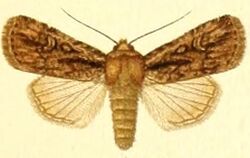Biology:Dichagyris signifera
| Dichagyris signifera | |
|---|---|

| |
| Scientific classification | |
| Domain: | Eukaryota |
| Kingdom: | Animalia |
| Phylum: | Arthropoda |
| Class: | Insecta |
| Order: | Lepidoptera |
| Superfamily: | Noctuoidea |
| Family: | Noctuidae |
| Genus: | Dichagyris |
| Species: | D. signifera
|
| Binomial name | |
| Dichagyris signifera (Denis & Schiffermüller, 1775)
| |
| Synonyms | |
| |
Dichagyris signifera is a moth of the family Noctuidae. It is found from Spain and France , east through central and southern Europe (including Italy and Greece) to Latvia and Russia .
Description
The wingspan is 34–40 mm.Warren (1914) states E. signifera F. (7 g). Forewing brownish grey with a reddish tinge ; the costal area , the median and submedian veins speckled pale grey and black; the veinlets blackish; a black streak from base below cell: stigmata as in turbans [error],Dichagyris disturbans but the reniform broader and not angled inwards; marginal area more prominently streaked with dark ; hindwing whitish, with a fuscous tinge towards margin, especially in the female.Widely spread, occurring in the Alps of France and Switzerland, in Germany, Austria, Hungary and Russia, and throughout W. Asia; Armenia, Asia Minor, Syria, Persia, Turkestan and W. Siberia; — in the ab. improcera Stgr. [Dichagyris orientis (Alphéraky, 1882)](7g), which is a duller insect, more like turbans [Dichagyris disturbans (Püngeler, 1914)] , the markings are all obscured; orientis Alph.Dichagyris orientis (7g) is much paler, uniform smooth ochreous grey, with the black basal streak and costal spots prominent ; both these aberrations are confined to W. Asia. [1]
Biology
The larvae feed on Echium, Poa and Plantago species.
References
- ↑ Warren, W. in Seitz, A. Ed., 1914 Die Großschmetterlinge der Erde, Verlag Alfred Kernen, Stuttgart Band 3: Abt. 1, Die Großschmetterlinge des palaearktischen Faunengebietes, Die palaearktischen eulenartigen Nachtfalter, 1914
 This article incorporates text from this source, which is in the public domain.
This article incorporates text from this source, which is in the public domain.
External links
Wikidata ☰ Q5272437 entry
 |

